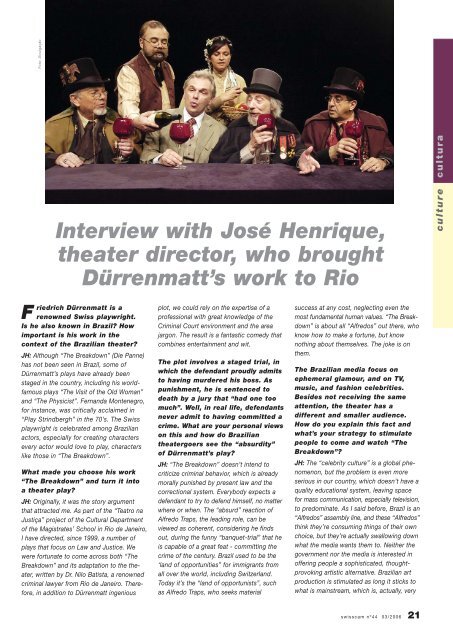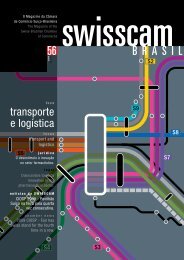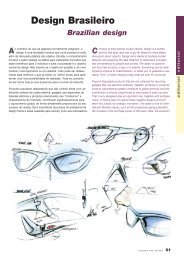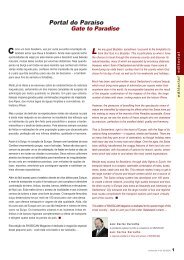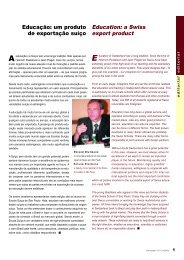01 Logística e Infra-estrutura no Brasil – Desafios e ... - Swisscam
01 Logística e Infra-estrutura no Brasil – Desafios e ... - Swisscam
01 Logística e Infra-estrutura no Brasil – Desafios e ... - Swisscam
Create successful ePaper yourself
Turn your PDF publications into a flip-book with our unique Google optimized e-Paper software.
cultura<br />
Foto: Divulgação<br />
F<br />
Interview with José Henrique,<br />
theater director, who brought<br />
Dürrenmatt’s work to Rio<br />
riedrich Dürrenmatt is a<br />
re<strong>no</strong>wned Swiss playwright.<br />
Is he also k<strong>no</strong>wn in Brazil? How<br />
important is his work in the<br />
context of the Brazilian theater?<br />
JH: Although “The Breakdown” (Die Panne)<br />
has <strong>no</strong>t been seen in Brazil, some of<br />
Dürrenmatt’s plays have already been<br />
staged in the country, including his worldfamous<br />
plays “The Visit of the Old Woman”<br />
and “The Physicist”. Fernanda Montenegro,<br />
for instance, was critically acclaimed in<br />
“Play Strindbergh” in the 70’s. The Swiss<br />
playwright is celebrated among Brazilian<br />
actors, especially for creating characters<br />
every actor would love to play, characters<br />
like those in “The Breakdown”.<br />
What made you choose his work<br />
“The Breakdown” and turn it into<br />
a theater play?<br />
JH: Originally, it was the story argument<br />
that attracted me. As part of the “Teatro na<br />
Justiça” project of the Cultural Department<br />
of the Magistrates’ School in Rio de Janeiro,<br />
I have directed, since 1999, a number of<br />
plays that focus on Law and Justice. We<br />
were fortunate to come across both “The<br />
Breakdown” and its adaptation to the theater,<br />
written by Dr. Nilo Batista, a re<strong>no</strong>wned<br />
criminal lawyer from Rio de Janeiro. Therefore,<br />
in addition to Dürrenmatt ingenious<br />
plot, we could rely on the expertise of a<br />
professional with great k<strong>no</strong>wledge of the<br />
Criminal Court environment and the area<br />
jargon. The result is a fantastic comedy that<br />
combines entertainment and wit.<br />
The plot involves a staged trial, in<br />
which the defendant proudly admits<br />
to having murdered his boss. As<br />
punishment, he is sentenced to<br />
death by a jury that “had one too<br />
much”. Well, in real life, defendants<br />
never admit to having committed a<br />
crime. What are your personal views<br />
on this and how do Brazilian<br />
theatergoers see the “absurdity”<br />
of Dürrenmatt’s play?<br />
JH: “The Breakdown” doesn’t intend to<br />
criticize criminal behavior, which is already<br />
morally punished by present law and the<br />
correctional system. Everybody expects a<br />
defendant to try to defend himself, <strong>no</strong> matter<br />
where or when. The “absurd” reaction of<br />
Alfredo Traps, the leading role, can be<br />
viewed as coherent, considering he finds<br />
out, during the funny “banquet-trial” that he<br />
is capable of a great feat - committing the<br />
crime of the century. Brazil used to be the<br />
‘land of opportunities” for immigrants from<br />
all over the world, including Switzerland.<br />
Today it’s the “land of opportunists”, such<br />
as Alfredo Traps, who seeks material<br />
success at any cost, neglecting even the<br />
most fundamental human values. “The Breakdown”<br />
is about all “Alfredos” out there, who<br />
k<strong>no</strong>w how to make a fortune, but k<strong>no</strong>w<br />
<strong>no</strong>thing about themselves. The joke is on<br />
them.<br />
The Brazilian media focus on<br />
ephemeral glamour, and on TV,<br />
music, and fashion celebrities.<br />
Besides <strong>no</strong>t receiving the same<br />
attention, the theater has a<br />
different and smaller audience.<br />
How do you explain this fact and<br />
what’s your strategy to stimulate<br />
people to come and watch “The<br />
Breakdown”?<br />
JH: The “celebrity culture” is a global phe<strong>no</strong>me<strong>no</strong>n,<br />
but the problem is even more<br />
serious in our country, which doesn’t have a<br />
quality educational system, leaving space<br />
for mass communication, especially television,<br />
to predominate. As I said before, Brazil is an<br />
“Alfredos” assembly line, and these “Alfredos”<br />
think they’re consuming things of their own<br />
choice, but they’re actually swallowing down<br />
what the media wants them to. Neither the<br />
government <strong>no</strong>r the media is interested in<br />
offering people a sophisticated, thoughtprovoking<br />
artistic alternative. Brazilian art<br />
production is stimulated as long it sticks to<br />
what is mainstream, which is, actually, very<br />
culture<br />
swisscam nº44 03/2006<br />
21


